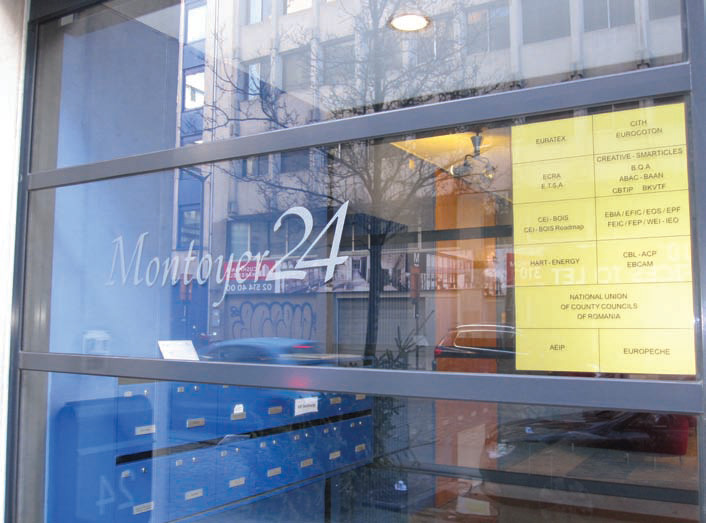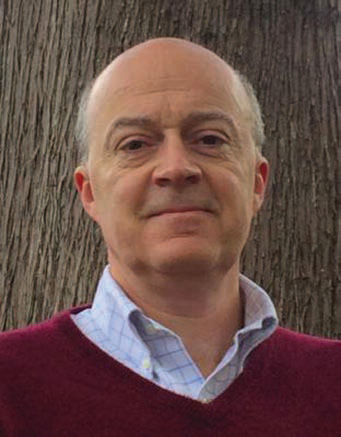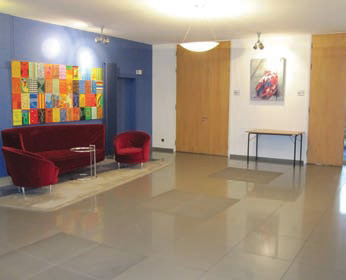New structure and goals for EPF
23 March 2016In the Spring of 2015, Clive Pinnington became the first managing director of the European Panel Federation (EPF). In this, the first in WBPI’s new series of interviews with the people helping to shape our global industry, Mike Botting spoke to Mr Pinnington about his new role.
The EPF saw three major changes in its structure during the past year: first, in March 2015, the federation welcomed the European plywood industry into its membership. This means that the EPF now represents every type of panel produced on the continent: MDF, particleboard, OSB, hardboard, softboard (insulation board) and plywood. The plywood sector had formerly been represented by its own association, the FEIC.
The second, and most significant, change in 2015 came in April, when the federation made some major changes to its management structure. Until that time, the EPF secretariat had been headed by the secretary general, Kris Wijnendaele, while the president came from the panel manufacturing industry.
Clive Pinnington joined the EPF as its first managing director in April 2015. He has a varied background with a number of international posts under his belt, all of which were panel industry related. For the previous nine years, he had been selling glues, resins and chain oils to panel manufacturers. Prior to that, he was located in Portland, Oregon, US, selling overlays to the plywood and woodworking industries.
At one time, Mr Pinnington worked for the international resin maker Dynea and became its representative on Formacare, the formaldehyde sector group of the European Chemical Industry Council (Cefic). Formacare represents key European producers of formaldehyde, aminoplast glues and polyols. It also defends the use of formaldehyde against the accusations made against it as a prime cause of certain cancers.
Explaining why he took on the post of managing director, Mr Pinnington said: "I liked the idea of working with the whole industry, rather than selling specific products to it and [my experience with] Formacare was a big part of the reason I wanted to join the EPF".
The title of managing director was chosen, rather than the more traditional association/federation title of 'secretary general', said Mr Pinnington, because the EPF wanted to show that it was bringing the disciplines of industry to the federation - disciplines such as targets, benchmarks, milestones and focus.
"These are defining days for our industry, with the formaldehyde and biomass [for electricity generation] issues, so we needed a bigger and stronger federation and this reorganisation is a major part of that.
"The switch to having a managing director has raised many questions, but that was the intention. The choice of title shows that the EPF is changing," he added.
The third major change in the federation was the election of Dr Paolo Fantoni as the new chairman of the EPF, replacing Ladislaus Döry who became honorary president, after 11 years as president. Dr Fantoni is vice-president of the Fantoni panels and furniture business, headquartered in Osoppo in Udine, Italy.
The role of chairman of the EPF is obviously not a full-time role for Mr Fantoni as he has a business to run. Nevertheless, the post of chairman does make considerable demands on its incumbent, but Mr Fantoni has great enthusiasm for the EPF - and for his role within it.
Kris Wijnendaele, now technical director of the EPF, began his career in trade associations with FESYP, which used to represent European particleboard makers until it joined the MDF association, the EMB, to become the EPF. He was then nominated as secretary general of the EPF.
"Kris's knowledge of the EPF and its workings is second to none," said Mr Pinnington. "He is a very gifted technician and has great knowledge of panels - and of the Brussels 'system'. He also looks after the finances of the federation. One could say, for comparison purposes, that I am the equivalent of the CEO and chief marketing officer (CMO) of the federation and Kris is chief technical officer (CTO) and chief financial officer (CFO)."
I asked Mr Pinnington how his role and that of the chairman differ.
"Paolo Fantoni is fully employed running his own business and the chairmanship is a voluntary role. He is the man with his hand on the tiller and sets the objectives of the EPF. It is my job to implement his decisions," he said.
For instance, Mr Pinnington said that Dr Fantoni has set five goals, which have been endorsed by the federation and are known as the 'Five new EPF cornerstones':
- To make E1 classification compulsory throughout Europe
- To establish a possible new c ommon standard for formaldehyde emissions in Europe and North America
- To define a strategy for approaching African nations and including them in the EPF's objectives and standards
- To engage with the construction sector to increase the market share of panels in building and construction
- To promote the sustainability of the industry's products and its environmental credentials.
Commenting on item 1, Mr Pinnington said it is all about enacting legislation to get at least E1 certification.
"We don't want panels being made, marketed or imported [into Europe] that are above E1. There is no danger of our members not complying - in fact they have committed to this since 2007/8 - but imports are still entering Europe which are above E1. There should be pan-Europe legislation requiring E1 or below."
With regard to item 2, standards, Mr Pinnington said that he wanted the EPF to drive any forthcoming legislation on standards and to help shape that legislation: "In time, we will become very visible in these matters. Formaldehyde is a two-part challenge: to continue promoting its safe use in the workplace; and its safe use in the home. This is a continuing task for us.
"With regard to item 3, we see Africa as a tremendous opportunity and we want Africa to look to us rather than to Asia or North America; we want to be a reference point for them, so they know how their industry should look," said Mr Pinnington.
"Concerning construction, we see that the vast majority of panels go into furniture and we want to see more going into building and construction."
The last point is particularly important to the EPF managing director. "Wood and panels do not have the public image that they should. Some people still think we are destroying the environment and that is so wrong. The 'urban forest'/recycled wood are the positive messages we must get across." Poland and Romania are firmly within the EPF's membership, though Russia and some other eastern European countries, and some in Turkey, are not yet fully included.
"We have some membership in Russia through the big western panel making groups, and a few private companies, and we have some in Turkey, also through western companies," said Mr Pinnington. "Our constitution says 'Europe' and Russia and Turkey are in Europe, so we want those companies in the EPF and we are determined to grow in the eastern countries."
I asked Mr Pinnington what he saw as the main purpose and objectives of the EPF. "I have chosen three main areas of the federation to look at. Those three are Federation Basics; Federation Essentials; and Federation Future. Everything we do should fit in one of these categories.
" The statistical side and reporting on the status quo is included in 'Basics', while 'Essentials' are about challenges to the status quo, for example new legislation, new trade deals - anything which will affect our members. 'Future' concerns those eastern countries I already mentioned and getting further into the construction sector, improving the industry's image, etc.
"We are in business to create the best future we can for the panel industry." Mr Pinnington went on to explain his 'Pentagon of Pride': "I want us to be in the middle of five things: the reindustrialisation of Europe; climate change; energy issues, including renewables; environmental issues; and employment".
The EPF has been active in recent years in lobbying the European Parliament, with 'Wood Action Days', jointly run with the European 'umbrella' woodworking industries organisation CEI-Bois, and the sawmilling federation, EOS.
"Together we also set up the Club du Bois as a meeting point with MEPs and it has been very successful and will continue," said the managing director. "It is under the chairmanship of German MEP Maria Noichl and is an excellent way to exchange ideas with MEPs, who are very interested in the role of wood based panels and especially the cascaded use of wood in a resource efficient, circular economy."
"I would like to get some of these legislators to visit panel factories more often. We have to keep talking to them and pointing out our challenges, such as wood costs, energy costs, competition with energy generators for wood and so on."
Mr Pinnington pointed out that the panel sector is also working with all other wood users to promote wood generically, not just in the form of panels.
"I want wood and wood based panels to be seen as the 'wonder resource of the future' in the eyes of consumers," he concluded.


